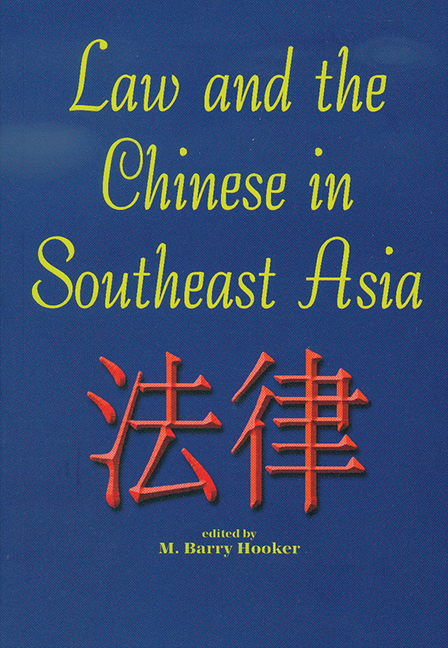Book contents
- Frontmatter
- Contents
- Preface
- The Contributors
- 1 Law and the Chinese Outside China: A Preliminary Survey of the Issues and the Literature
- 2 The Legal Position of the Ethnic Chinese in Indochina under French Rule
- 3 Law and Memory, De Jure to De Facto: Confucianization and its Implications for Family and Property in Vietnam
- 4 English Law and the Invention of Chinese Personal Law in Singapore and Malaysia
- 5 The Indonesian Chinese: “Foreign Orientals”, Netherlands Subjects, and Indonesian Citizens
- 6 Chinese Family Firms in Indonesia and the Question of “Confucian Corporatism”
- 7 China's Citizenship Law and the Chinese in Southeast Asia
- Index
3 - Law and Memory, De Jure to De Facto: Confucianization and its Implications for Family and Property in Vietnam
Published online by Cambridge University Press: 21 October 2015
- Frontmatter
- Contents
- Preface
- The Contributors
- 1 Law and the Chinese Outside China: A Preliminary Survey of the Issues and the Literature
- 2 The Legal Position of the Ethnic Chinese in Indochina under French Rule
- 3 Law and Memory, De Jure to De Facto: Confucianization and its Implications for Family and Property in Vietnam
- 4 English Law and the Invention of Chinese Personal Law in Singapore and Malaysia
- 5 The Indonesian Chinese: “Foreign Orientals”, Netherlands Subjects, and Indonesian Citizens
- 6 Chinese Family Firms in Indonesia and the Question of “Confucian Corporatism”
- 7 China's Citizenship Law and the Chinese in Southeast Asia
- Index
Summary
Given that the Vietnamese legal texts, written in classical Chinese, the court language, embodied Confucian legal principles and not necessarily Vietnamese social practice, it is no wonder that European travellers in nineteenth-century Vietnam were struck by cultural resemblances between Vietnam and China. French colonial scholars, like their British and Dutch counterparts, translated classical legal texts which embodied ideals of the élite culture, and inevitably these were used by administrators as the basis for colonial law. The distinction between black letter law and social practice, however, appears to have been lost on colonial legal commentators, with unfortunate results for women in particular. Indeed, French practice enshrined in Vietnamese law the precepts of the last reigning dynasty, notable for its strict adherence to the Chinese Qing legal model. After independence, aspects of French colonial law, based on the Confucian model, became part of Vietnamese administrative law, especially with regard to family, property, and inheritance. This legal evolution moved further with the Marriage Law of 1986, and Land Laws of 1988 and 1993 which, in their implementing regulations, followed customary law. Thus, in the space of four centuries, Confucian law, originally an instrument of government, has become social practice. In the process, the memory of pre-Confucian forms of ordering family and property has been attenuated or erased from the collective consciousness.
Prior to state attempts to Confucianize Vietnamese society, family and property relations maintained a certain equity between males and females and between older and younger brothers and sisters. As a result, however, of the combined forces of Confucian government with colonial law and their attendant social effects, patrilinial and patriarchal social organization supplanted the earlier model. By the end of the twentieth century, for example, critical aspects of customary law applied to land use, and inheritance included the provision that land is held by the head of household, normally defined as the oldest direct descendant on the paternal side of the family. Following current law, only one person can be designated head of household; and following custom, that person is the eldest in the patrilineal line of descent. Why? Because Confucian custom decrees it. The irony is that Confucian-inspired custom is a relatively recent phenomenon in historical terms when compared with the notion of a Vietnamese ethnic and cultural consciousness which itself had found political expression many centuries earlier.
- Type
- Chapter
- Information
- Law and the Chinese in Southeast Asia , pp. 65 - 94Publisher: ISEAS–Yusof Ishak InstitutePrint publication year: 2002

